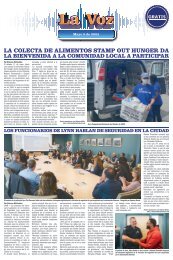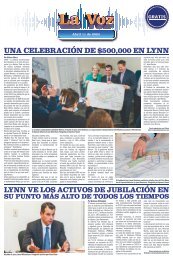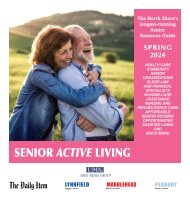You also want an ePaper? Increase the reach of your titles
YUMPU automatically turns print PDFs into web optimized ePapers that Google loves.
FEBRUARY 6, 2020
WEEKLYNEWS.NET - 978-532-5880 5
How to reduce the
risk of a heart attack
February is often considered
the month of love, with couples
and family members sending
heart emojis, heart-themed
cards and heart-shaped chocolates.
But what’s a better gift
to your loved ones than taking
care of your heart?
February is American Heart
Health Month. And while you
might first think of it as routine
campaign — it’s becoming
more important than ever.
Cardiovascular or heart disease
is the leading cause of death in
women and men, with obesity
and diabetes, which increase
a persons’s risk of heart attack
and stroke, on the rise.
While the statistics are
alarming, don’t panic. Research
shows that lifestyle changes can
greatly reduce your risk. Here’s
what you need to know:
What is American Heart
Health Month?
It’s a time to raise awareness
about the serious dangers of
heart disease and help people
work to reduce their risk of
heart attack, stroke and other
related complications.
The American Heart
Association promotes its wide
array of resources and partnerships
to provide people with
tools to reduce high blood pressure,
stress, help them eat better,
exercise and other key changes.
Why American Heart
Health Month is so
important:
Heart disease is responsible
for about one in every four
deaths in the U.S., claiming the
lives of more than half a million
people each year. About
735,000 Americans will have a
heart attack this year.
The numbers are scary, but
the steps to reduce your risk are
simple and clear.
How to reduce your risk of
heart disease and
heart attack:
The CDC outlines the top
lifestyle changes to make to
avoid heart complications. They
include the following:
• Quit smoking, this includes
e-cigarettes
• Maintain a healthy weight
• Eat a healthy diet and avoid
trans fats
• Start moving
• Treat your other health conditions,
especially if you have
high blood pressure, high cholesterol
and diabetes
The main takeaway? A person’s
lifestyle plays a huge role
in increasing or reducing their
risk, explained Dr. Suzanne
Steinbaum, a cardiologist at
The Mount Sinai Hospital and
a volunteer medical expert for
American Heart Association’s
Go Red for Women.
“All of these different components
are really what leads to
heart disease. This is all driven
by lifestyle. In my mind, that’s
very empowering because you
get to actually change the outcome
of your life based on how
you live daily,” said Steinbaum,
who serves as a national spokesperson
for the American Heart
Association.
Lastly, know the signs of
heart attack and stroke.
“It’s always about baby steps.
It’s never too late, let’s just start
there. It’s never too late to start
eating healthy, it’s never too late
to start moving. But you certainly
don’t start by running a
marathon, you start by walking
around the block,” she said.
Start walking around the
block daily.
Or find a low-impact, beginner
workout video for free
online. (Check out this guide.)
“We have become a truly sedentary
culture and the risk of
that is significant,” Steinbaum
said. “We see that if people get
up from their desks every hour,
even for a few minutes, it decreases
their risk. So I say to
everyone, you don’t have to go
the gym and go crazy, but you
do have to get up and do something.
And even walking shows
benefits.”
In addition to physical benefits,
aerobic exercise such as
walking, jogging or biking is
shown to increase cognition
and brain function in adults of
all ages.
Eat whole foods and limit all
sugary drinks.
This includes diet beverages,
and while you’re at it, steer
clear of fried food and processed
food
What does that mean on a
day-to-day basis?
“If you look at a package and
you can’t pronounce some of
the words that are in the ingredients,
don’t eat it. If there’s a
lot of chemicals, it’s processed
and it’s not good,” Steinbaum
Have a story to share?
Need a question answered?
contactus@essexmedia.group
said.
Eating vegetables gives
your body vitamins, minerals,
antioxidants and fiber. Some
healthy options? Consider
steamed vegetables with lean
protein such as chicken or fish,
whole wheat pasta with vegetables,
snacks such as nuts or an
apple with peanut butter or almond
butter that’s not heavily
sweetened.
“Whole foods help in stabilizing
sugar levels, decreasing
cholesterol and blood pressure,
they are really functionally
helpful to us,” Steinbaum
explained.
Reduce your stress.
There is an “enormous
amount” of literature linking
chronic psychological stress
to heart disease, noted Joel
Dimsdal, distinguished professor
emeritus and research
professor in the department of
psychiatry at the University of
California San Diego.
In his analysis of scientific literature,
he noted one study that
found people who felt chronic
or “permanent stress” at work
or at home were more than two
times more likely to develop a
heart attack.
In addition, being depressed
increases your risk, noted
Steinbaum, as it raises your
body’s level of inflammation.
“It needs to be managed
whether through lifestyle, medication.
Depression increases
risk of heart disease four fold,”
the cardiologist noted.
So what do you do about it,
when you feel anxious or helpless?
First and foremost, you
can always call, text or chat
with someone 24/7 to get immediate
mental health support.
Secondly, consider seeing a
professional counselor, therapist
or even talking with your
doctor. There are most likely affordable
or free options in your
community, or people who can
point you to someone. In addition,
consider adding meditation,
exercise, prayer and more
time with friends into your
schedule.
“Heart health is not something
to blow off,” Steinbaum
said. “Again, it’s never too
late.”
Marguerite Ward is an editor
and staff writer for Today. Her
story was reprinted by Danversbased
Senior Helpers.
PETER A. TORIGIAN
CENTER
*****
Activities
Thursday, Feb. 6
8:30 a.m. Quilting. 9:15 a.m.
Whist. 9:30 a.m. Big Band
dancing, advanced painting. 10
a.m. Fall risk evaluation. 12:15
p.m. Movie with Earl. 12:30
p.m. Bridge, senior connections.
1 p.m. Sing-along. 2 p.m.
Rehearsal.
*****
Friday, Feb. 7
8 a.m. Beginner painting,
TOPS weigh in. 9 a.m.
Aerobics, computer and phone
help. 9:30 a.m. TOPS meeting.
11:15 a.m. Chair yoga. Noon
Open art studio. 12:30 p.m.
Bingo, enhanced fitness. 1
p.m. Ping pong, Scrabble.
*****
Seniors
Monday, Feb. 10
9 a.m. Aerobics, duplicate
Bridge, learn Mah Jongg,
tambourine team. 9:30 a.m.
Podiatrist. 10 a.m. Drill team.
11:15 a.m. Zumba. 12:30 p.m.
Bridge, model ship building,
Bingo. 2 p.m. Caregivers support
group.
*****
Tuesday, Feb. 11
9 a.m. Taxes. 9:15 a.m.
Whist. 9:30 a.m. Exercise with
Edye, Bunka. 10:30 a.m. Line
dancing. Noon Mah Jongg.
12:30 p.m. Crocheting/knitting,
party set up.
*****
Wednesday, Feb. 12
9 a.m. Aerobics, rug hooking,
wood carving. 10:15 a.m.
Zumba. 10:30 a.m. Learn to
play pool. 12:30 p.m. Model
ship building. Valentine’s Day
party.
Looking for a house?
Check the real estate secton!

















